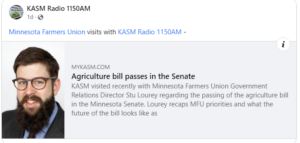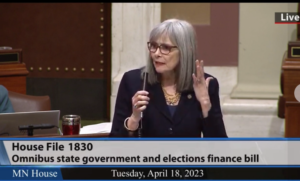Legislative Update: House bill supports AG’s antitrust work
With just over a month—and even fewer legislative days—left in the 2023 legislative session, lawmakers are continuing to work long hours toward their May 22 deadline. This past week included the legislature passing a bipartisan ag bill out of the Senate, approving Rural Finance Authority (RFA) funding in the House, releasing the House tax package, and House passage of important support for antitrust work. MFU has testified on priority issues, met with lawmakers and otherwise worked to be sure that the needs and perspectives of family farmer members are reflected in a final deal.
As the pace continues to pick up, stay up-to-date with MFU’s legislative work by following us on Facebook and Twitter. You can also find the latest calendar of hearings here, and watch live House and Senate debates here and here.

Now’s a good time to contact legislators about your support for proposals that are still being considered—you can find your legislators and their contact information here. If you need help finding the right person to get in touch with on an issue or need more context, reach out at stu@mfu.org or (320) 232-3047.
Senate action
On April 13, the full Senate approved Chair Aric Putnam’s omnibus agriculture and broadband bill (SF1955) on a broad bipartisan vote (58-7). As I’ve described in past updates, the $445 million package includes $48 million in new spending for the Minnesota Department of Agriculture (MDA), Agricultural Utilization and Research Institute (AURI), and the Board of Animal Health (BAH). While needs—and surely requests—outpaced funding available in the committee’s spending target, this discretionary increase is significant when compared to the roughly $15 million approved last year.
Putnam, DFL-St. Cloud, prioritized issues MFU brought before the committee this session including establishing a grain indemnity fund, new funding for expanding local and regional meat processing, grants to dairy farmers to purchase risk protection, support for beginning and emerging farmer programs, an expansion of MDA’s soil health financial assistance program and biofuels infrastructure grants, and funding for cooperative development. You can read more about the budget proposal here and see MFU’s full written response here.
“In all, this is a strong bill,” said MFU President Gary Wertish in written remarks to the committee. “We appreciate your partnership and hard work to develop a proposal that will support family farmers, re-localize supply chains, lift up new farmers, and ensure the continued vitality of rural communities. I’m proud to share our support.”
Putnam’s colleagues were glad to support the bill as well, with Ranking Minority Member Torrey Westrom, R-Elbow Lake, leading a majority of his Republican colleagues in voting to support the bill. In remarks before the full legislature, he described how this bill builds on work related to meat processing and other issues.
On the floor, Putnam thanked MFU for our work on the proposal and highlighted how the listening sessions in Pierz and Faribault—along with all the farmers who made time to visit the capitol—helped inform his proposal.
“This bill was not hatched in a committee hearing in St. Paul,” Putnam shared with his colleagues. “It was written in greater Minnesota.”
House action
The House also took a bipartisan vote on April 13 to advance Chair Samantha Vang’s bill (HF463) to replenish the Rural Finance Authority’s (RFA) revolving loan fund with $50 million. This is important because that bonded loan account—which includes the popular Beginning Farmer Loan—is set to run out of funding this year.
“This bill was born out of the farm crisis of 1986 to deliver farmers affordable loans and services,” said Vang, DFL-Brooklyn Center, in remarks to her colleagues. “They remain an important tool for farmers.”
Tax proposals
On April 17 the House released their full tax proposal that includes a total of $3 billion of tax reductions and credits over the next biennium. You can read the full 300 page bill here.
“This bill constitutes the largest tax cut in Minnesota history,” said Chair Aisha Gomez, DFL-Minneapolis, in a press conference preceding the bill’s release in committee. “But these aren’t just any tax cuts. The cuts in this bill are targeted to those who need it the most, including seniors living on fixed incomes, families and children living in poverty, and Minnesotans across the state who are facing high property tax bills.”
Gov. Walz and DFLers have continued to emphasize their proposed investment in the working family tax credit, which could slash the number of children who live in poverty. The bill also includes rebate checks of up to $550 for married couples, elimination of Social Security taxes for those earning under $100,000, and the creation of a new fifth tier for those earning more than $600,000 annually.
The proposal includes Vang’s bill (HF2277) to extend and expand Minnesota’s Beginning Farmer Tax Credit, allowing family members to participate to assist in generational land transition, increasing the credit for emerging farmers, and increasing the credit for sale of ag assets from 5 percent to 8 percent up to $50,000. Without action this program is set to expire this year.
“This successful and pioneering program has helped well over 1,000 new farmers grow new farm businesses across the state,” Wertish said in written remarks to the committee. “This is important not just to those families, but also to rural schools, small businesses, and thriving rural communities.”
MFU also voiced continued support for Soil and Water Conservation Districts (SWCDs) which would also be funded from a new local government aid program in Gomez’s tax proposal.
“SWCDs serve as the trusted, local, boots-on-the-ground partners . . . providing direct technical assistance, demonstrating new practices, and connecting with state and federal resources,” Wertish said, highlighting MFU members’ vote to support SWCDs at convention.
Senate Tax Chair Anne Rest, DFL-New Hope, has yet to release her tax proposal, the final omnibus budget bill to be unveiled in either body. MFU has been hearing from members about increased property tax assessments and we’re hopeful we can advance two additional proposals in the Senate. First, Walz and Revenue Commissioner Paul Marquart proposed an additional 15 percent increase to the Ag to School tax credit, which reimburses owners of ag land for 70 percent of a school construction bond levy. Second, we support Sen. Bill Weber’s, R-Luverne, proposal (SF973) to increase the first-tier limit on ag homestead to $3.5 million, keeping better pace with rising land values. We’re also working to address issues experienced by members who farm small acreages and are having trouble accessing ag homestead and other tax advantages, though that proposal will likely require work over the interim.
Fighting monopolies
On competition, Rep. Ginny Klevorn’s, DFL-Plymouth, state government budget bill (HF1830) passed the House (70-59) on April 18, advancing proposals that would increase the Attorney General’s capacity to pursue antitrust cases.

Rep. Ginny Klevorn’s State Government budget bill (HF1830) passed the House (70-59) on April 18.
The bill includes new, ongoing founding to hire antitrust attorneys, one-time funding to establish a multistate litigation fund and $2.5 million in one-time funding for antitrust and nonprofit oversight. Sen. Erin Murphy’s state government bill (SF1426) is set for a vote in the full Senate yet this week.
In a letter drafted by MFU’s Antimonopoly Director Justin Stofferahn and signed by a coalition of organizations, we lay out the case for action on competition using some powerful data:
“The increased concentration of economic power touches nearly every aspect of our economy. Between 1997 and 2012 approximately 75 percent of industries became more consolidated, while the US economy grew 50 percent more concentrated since 2005. At the current rate of consolidation, it is estimated that the US will have just one company by 2070.
“The growing power of corporate monopolies harms Minnesotans, as giant firms use their power to raise prices, lower wages, offshore jobs, hurt smaller businesses, and influence public policy and politics. The average American’s wages are 20% lower because of monopoly power. Corporate profits and the lack of competition are responsible for nearly half of recent increases in inflation. While people are making less and paying more, the number of small businesses has declined and family farmers are making less than they ever have.”
Climate and working lands action
Late last night, the Senate Finance Committee approved Chair Foung Hawj’s, DFL-St. Paul, omnibus environment and natural resources package, which includes significant funding for soil health programs run through the Board of Water and Soil Resources (BWSR). Chair Nick Frentz, DFL-Mankato, secured an additional $9 million for the new green fertilizer production incentive MFU has worked hard to establish this session. The now $21 million program would give grants to farmer-owned cooperatives to purchase equity in local ammonia production that uses hydrogen produced through electrolysis. This technology not only has the potential to dramatically reduce the carbon footprint of conventional fertilizer, but also shorten supply chains, create greater resilience, and provide farmers a more stable market for inputs.
Coming events
Wertish will attend Walz’s State of the State address on April 19 and the Senate plans to vote on establishing a MNCare public option. There’s also an April 29 virtual meeting on the public buy-in option.
If you have questions, thoughts, or concerns about MFU’s legislative work, please reach out at stu@mfu.org or (320) 232-3407 (C).
